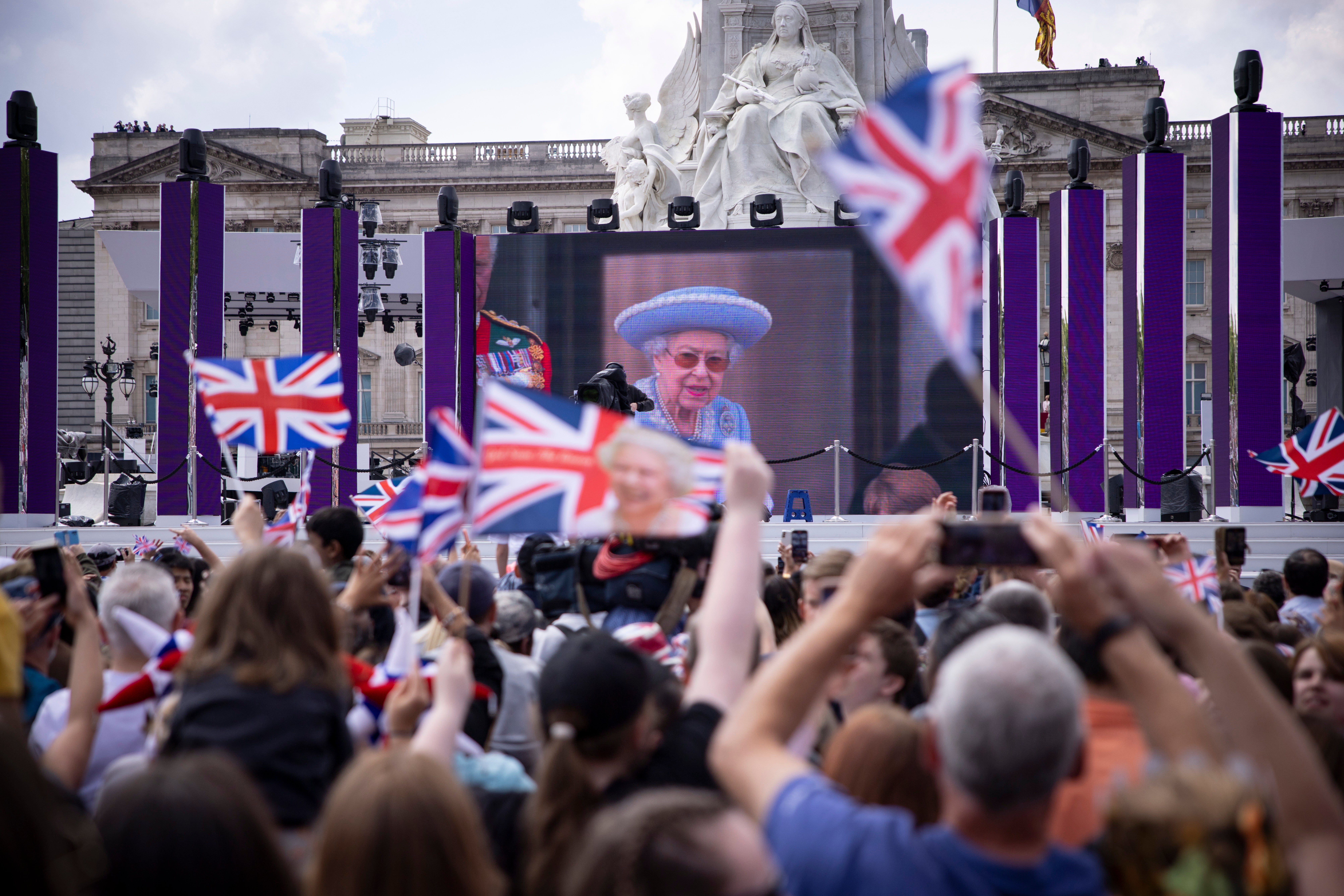Media coverage of the platinum jubilee makes me uncomfortable to work in this industry
As a Black woman descended from enslaved African people, the likes of whom were branded with hot irons bearing the initials of royal family members, the past four days of wall-to-wall, uncritical responses to the jubilee have been a gaslighting experience


Most of the UK’s media coverage around the Queen’s platinum jubilee has failed to examine the past 70 years through the lens of race, despite key events leading up to the occasion.
Aside from a handful of insightful first-person pieces, parts of the press have exclusively gone with a celebratory tone of reporting around the event, failing to examine royal colonialism or include alternative perspectives, such as dissenting voices from within the growing republican movement.
This is an occasion where the news agenda hasn’t been driven by actual conversations around a particular topic. Rather, it’s been determined by an unspoken ultimatum to both news consumers and colleagues alike: maintain the status quo and show deference or face social ostracism. For a country so preoccupied with fairness and freedom of expression, that seems utterly wild to me.
Amid the jubilations, conversations around racism and the royals have largely been buried. It’s as if we’ve gone back years – before the resurgence of the global Black Lives Matter movement and public statements of solidarity with the anti-racism cause – to a time where openly discussing racism and its relationship with the establishment was completely taboo. Two steps forward, three steps back.
Be that as it may, it’s impossible to divorce the royal family from themes of systemic racism. The spectacular backlash drawn from local communities during recent royal tours of the Caribbean in March and April clearly reflect this – and yet news coverage conveniently side-stepped this reality.
As a Black woman descended from enslaved African people who were trafficked from the continent to work on plantations in Jamaica, the likes of whom were branded with hot irons bearing the initials of royal family members, I’ve got to tell you that the past four days of wall-to-wall, uniformed, uncritical response to the jubilee has been a gaslighting experience.
It is quite possible to celebrate the Queen’s life, as a human being, and empathise with the desires of her family and fans alike to lavish her with praise, without blindly lauding the institution that was only made viable through slavery and the oppression of those deemed racially and socially inferior.
Mind you, the skewed coverage comes as no surprise when you consider the chronic lack of diversity of UK journalism. A recent report by the National Council for the Training of Journalists revealed that the proportion of editors from non-white ethnic backgrounds is only 10 per cent, compared to 14 per cent in junior roles, suggesting that more needs to be done to promote journalists from other ethnicities into senior positions.
The same study shows that some 87 per cent of journalists are white and overwhelmingly middle class, while other research indicates that Black journalists account for just 0.2 per cent of working journalists in Britain.
Editors set the news agenda, which is why diversity is important at this level too – not just in lower-tiered positions. So, if most editors are ardent royalists or traditionalists from relatively privileged backgrounds who do not see fit to prioritise voices from communities with alternative views on the monarchy, we get homogenous coverage, boasting of how the British monarch heads up a Commonwealth union, while newsrooms are unable to explain the tangible benefits of such an institution.
Muthoni Mathenge, now in her 80s, was tortured with axes during Kenya's struggle for independence from British colonial rule. She’s asking for compensation from the Queen for her ordeal. This has received very little media attention.
Weeks ago, Kenyan peoples who were displaced by British settlers in a colonial landgrab wrote to Prince William on the topic and fruitlessly lobbied the foreign office for a meeting while they were in town – this was barely reported on.
Thumbing through a handful of collectors’ edition magazines commemorating the Queen’s jubilee during a trip to the supermarket, I was interested to see that very few mentioned the race uprisings of 1981, the New Cross fire of the same year, the MacPherson report or the protests of 2011 or 2020 in their rundowns of important milestones throughout the decades.
Enquiring minds want to know why these events were conveniently left out; is the struggle for racial equality, and perhaps the monarch’s inaction on it, a stain on British history? Absolutely. But it is the truth, and the record should reflect that all the same.
The Windrush migration was also largely omitted from this glossy memorabilia, I noted, as I read the magazine among union jack bunting and monarchial shortbread biscuits – this despite the fact that Britain’s infrastructure wouldn’t be what it was without their contribution.
Perhaps the latter isn’t so staggering. As Queen Elizabeth II acceded to the throne in 1952, the government of the day was rolling out a covert plan to rid Britain of its newly arrived Windrush settlers, who were a largely unwelcomed presence despite having been invited to help rebuild war-torn Britain.
The Working Party on Coloured People seeking Employment in the United Kingdom, an interdepartmental working group staffed by civil servants, was established the same year, and asked by the government to compile figures to prove that the arrival of Windrush migrants in Britain was problematic through covert surveillance initiatives via the Department for Work and Pensions and national police forces. The idea was that the right results would justify immigration controls to prevent more of them from travelling here.
Putting the origins of its supremacy to one side, the royal family has more contemporary questions to answer on race. Will you apologise for the aforementioned working party? Why haven’t you mentioned the Windrush scandal in any of your speeches?
Has the royal household ever housed Black and brown refugees fleeing conflict, as it has recently done with our white neighbours fleeing Ukraine?
What really happened with Meghan Markle and Harry, and how she in particular was treated? Sure, the couple pointed out that the Queen didn’t make the comments about Archie’s skin colour, but transparency is still lacking.
People of ethnic minority backgrounds were banned from holding clerical positions at Buckingham Palace until at least the late 1960s. Why was this practice implemented, and when – or to what extent – was this abandoned?
Following the Sussexes’ Oprah interview last March, Buckingham Palace published its diversity data for the first time, which showed it’s lagging behind other UK institutions. What measures have been implemented to make the improvements that have been pledged?
Why are royal family members refusing to engage on recent calls for slavery reparations in any meaningful way?
Is the palace content that the proportion of Black children entering the youth justice system has increased by 7 per cent in recent years while the overall number is reducing?
The Queen has often been hailed as working hard, yet few have seen Her Majesty engineer improvements on race in 70 years. In all of her years as head of the commonwealth, has wealth become more common within former British colonies?
The Platinum Party at the Palace, broadcast via BBC One on Saturday night, showcased a roster of racially diverse entertainers celebrating Her Majesty. Sadly, that’s not nearly enough to address ingrained injustices visited on people who bear our heavy hue, and neither are the record number of birthday honours dished out to Black and brown recipients this year (13.3 per cent compared with 8 per cent in 2016).
Paddington Bear, a fictional talking animal from Peru, was seen to be having tea with Queen Elizabeth in a warm comedic skit shown at the beginning of the programme. However, it wasn’t lost on many that the Home Office is currently planning to routinely deport asylum seekers from Britain to Rwanda. It’s like a state-sanctioned “go back to Africa” slur of racism.
As I type, the Home Office is suppressing a report it commissioned which found that decades of racist policy led to the Windrush scandal.
Earlier this week, campaign group Republic announced that it will be writing to the BBC calling for a review of their royal coverage and its relationship with the palace following days of “sycophantic” and “one-sided” reporting of the jubilee.
CEO Graham Smith said the corporation has failed to provide the balance that’s required of them. “The BBC has a duty to provide impartial and balanced coverage at all times. That includes reporting on the monarchy,” he said in a press release issued on Wednesday morning.
To keep up to speed with all the latest opinions and comment, sign up to our free weekly Voices Dispatches newsletter by clicking here
While the BBC faces heightened scrutiny because it is funded by taxpayers – just as the royals are – many more news platforms have fallen short in this regard.
Even now, the government footed the £28m bill for jubilee celebrations despite the cost of living crisis gripping the poorest communities and disproportionately striking ethnic minority groups, who are more likely to lose income and fall into debt while trying to make ends meet – something that’s also been missing from the bulletins.
So, any way you slice it, parts of the media have done a complete disservice to the British public by refusing to objectively report on racism – and the jubilee more broadly – around this 70-year turning point. And, to be honest, institutional failures like this make me very uncomfortable about working in the UK media industry.
I don’t mind admitting that I was conflicted about writing this piece due to concern about being trolled and labelled as a troublemaker for going against the grain. But it would be remiss of me to not say something, and I doubt I’m the only one who thinks this.
Bookmark popover
Removed from bookmarks